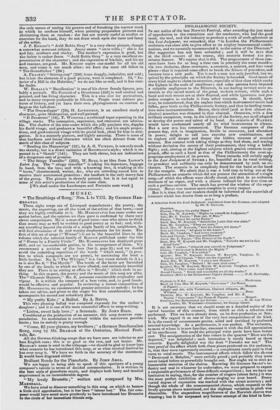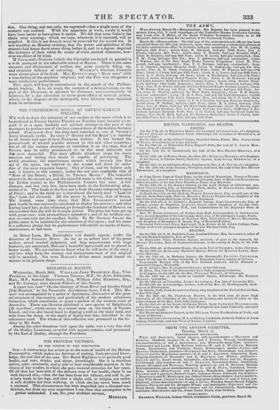PHILHARMONIC SOCIETY.
Ix our notice of the last Norwich Festival, after awarding the just meed. of approbation to the committee and the conductor, who had the good taste, the zeal, and the industry to produce a work of such splendour as the Last Judgment, we remarked, that " in London the Philharmonic orchestra was alone able to give effect to its mighty instrumental combi- nations, and we earnestly recommended it to the notice of the Directors." Our suggestion has not been unheeded ; and it will be seen that at the third concert of the season, this oratorio formed tue pro- minent feature. We rejoice that it did. The programmes of these con- certs have been for so long a time cast in precisely the same mould-e. viz. two sinfonias, three overtures, a concerto, a quartet, and four vocal pieces—that it required some effort to break the fetters of precedent, and venture into a new path. Yet is such a step not only justified, but re- quired by the principles on which the Society is founded. Good music of every kind ought to claim its attention, especially of that class which ranks the highest in the scale of excellence ; and some persons have imputed a culpable negligence to the Directors, in not :having devoted more at- tention to the sacred music of the great modern writers, while such a band and such means are at their disposal, and while ignorance and pre- judice conspire to exclude it from other concerts. It should, how. ever, be remembered, that the neglect into which instrumental music had fallen, gave birth to the Philharmonic Society, and that its leading mem. hers were instrumentalists. Hence their chief (and at first almost ex- clusive) attention was directed in that channel. Oratorios, with a few brilliant exceptions, were, in the infancy of the Society,not at all adapted to develop the power and talent of its band. An oratorio of HANDEL would have condemned nearly all its wind instruments to silence. But a new mra has commenced. The German composers of the present day, rich in imagination, fertile in resources, and abundant in power, delight to call into exercise new combinations, and to explore still deeper and deeper the hidden recesses of musical science. Not content with taking things as they find them, and tracing without deviation the course of their predecessors, they wing a bolder flight ; and, aiming at the highest subjects which genius ventures to ap- proach, offer to such a band as that of the Philharmonic the most ap- propriate employment of its powers. These remarks will strictly apply to the Last Judgment of Spotlit ; for, beautiful as is its vocal writing, its grandeur and sublimity can only be demonstrated by such an or- chestra. The oratorio is as completely fitted for the band as the band for the oratqrio. We admit that it was a bold step to bring out at the Philharmonic an oratorio which did not present the attraction of a single song--of which the effects were chiefly choral, and that in an orchestra destitute of an organ, and with a chorus inlisted for the first time on such a perilous service. The result has proved the wisdom of the expe- riment. Never was success more complete in every respect.
But it is time that our readers should be informed of the materials of a concert which has drawn from us so long a preface.
ACT I.
A Selection from the Last .7udgment; translated from the German, and adapted. by Mr. E. TAYLOR.
Overture. Chorus, "Praise his awful Name."
Solo, Mrs. W. Knyvett," Mighty he cometh to Judgment."
Solo, Mr. E. Taylor, " Fear not, 0 Man." Chorus, "Praise his awful Name."
Recit. Mrs. W. Knyvett," Behold the Lamb that was slain."
Solo, Mr. Vaughan, " Weep no inure." Recit. Mrs. W. Knyvett, "And the Elders fell down." Solo and Chorus," All glory to the Lamb."
Recit. Mr. Vaughan," And every creature."
Solo and Chorus, "Blessing and Honour." Recit. Mr. F.. Taylor, "The Princes of the Earth."
Duet, Mrs. W. Knyvett and Mr. Vaughan, "Forsake me not in this
dread hoar."
Air, Mr. Vsaighan, "Jehovah now cometh to Judgment." Chorus "Destroyed is Babylon the Mighty !"
Solo, dr. Vaughan, "It is ended." Quartet, Mrs. W. Knyvett, Messrs. W. Knyrett, Vaughan, E. Taylor, and Chorus, " Blest are the departed" Recit. Mrs. W. Knyvett." I saws new Heaven." Solo, Mr. Vaughan. "Behold ! He soon shall come." Quartet, Mrs. %V. Knyvett, Messrs. W. Knyvett, Vaughan, and E. Taylor, "Then come, Lord Jesus I" Grand Chorus, Great and wonderful are all thy works." Overture (MS.) to the Midsummer Night's Dream F If, Bartholdy.
ACT II.
Sinfonia in E flat Neukomm. Recit. ed Aria, Mrs. W. Knyvett, " Dore sono " (Le Nozze
di Figaro) Mozart.
Adagio and Air, with Variations, Clarinet obligato, Mr
Willman Beer.
Terzetto, Mrs. W. Knyvett, Mr. Vaughan, and Mr. E
Taylor," Cosa sento " (Le Nozze di Figaro) Mozart.
Overture, Der Beherrscher der Geister..... C M. von Weber. Leader, Mr. Weichsell—Conductor, Sir George Smart.
It is not necessary that we should enter on a detailed notice of the varied beauties of this oratorio, from which so rich a selection was performed. This we have already done, on its first production at Nor- wich. We regard it as one of the very best compositions of its kind. It is the result of consummate genius, aided and enriched by profound musical knowledge. As a performance, it was perfect. The orchestra, to most of whom it is now familiar, executed it with the full appreciation of its excellences. Nor could the principal voice parts have been better cast. The amalgamation of the four voices in the quartet "Blest are the departed," was delightful : such intonation is rarely heard at these concerts. Equally delightful was the duet "Forsake me not." The best proof of the effect which both, these pieces produced on the audience, is, that they were rapturously encored,—a compliment rarelypaid in that room to vocal music. The instrumental effects which follow the chorus "Destroyed is Babylon," were awfully grand ; and probably they were never heard before so powerfully brought out. Nor ought we to omit an honourable mention of the chorus. Knowing Sir GEORGE SMART'S in- dustry and zeal in whatever he undertakes, we were prepared to expect a respectable performance of these difficult compositions ; but we have no hesitation in saying, that, for the number of singers (about forty,) it was the most perfect exhibition of chorus-singing we ever heard. Every varied degree of expression was marked with the nicest accuracy ; and. though the whole of the unaccompanied chorus, which responds to the lovely quartet above mentioned, not the slightest variation in pitch was discernible. The stupendous magnificence of the Norwich chorus was wanting; but it far surpassed any former attempt of the kind in Lon- don. One thing, and one only, we regretted—that a single note of the oratorio was omitted. With the apparatus at work, surely it would have been better to have given it entire. We felt that some links in the chain were wanting ; which we hope, whenever it is repeated, will be supplied. If this is not done,it must be reserved for the second act. It was manifest on Monday evening, that the power and splendour of the oratorio had borne down every thing before it, and in a degree deprived the audience of their relish for music of a less exalted character, how- ever excellent of its kind.
M NEUKOMM'S Sinfonia (which the Chevalier conlucted in person) is a w rk produced in the admirable school of HAYDN. There is the same cleaness and distinctness of outline, the same masterly filling up, and exquisite delicacy of colouring. Wiraataa's Clarinet Concerto wasa masterpiece of its. kind. Mrs. KNYVETT sung " Dove sono" with a true feeling of the exquisite original; and the Trio was altogether a most satisfactory performance. This night will long be remembered in the annals of the Philhar- monic Society. It is, we trust, the earnest of a determination, on the part of the Directors, to advance its chhracter, and consequently its interests, by a due attention to those great efforts of musical genius, which, to the disgrace of the metropolis, have hitherto been banished from its orchestras.



























 Previous page
Previous page